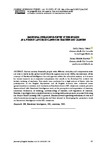Emotional Intelligence Survey in the English as a Foreign Language Classroom: Teachers and Learners

Use this link to cite
http://hdl.handle.net/2183/33044Collections
- Investigación (FEDU) [938]
Metadata
Show full item recordTitle
Emotional Intelligence Survey in the English as a Foreign Language Classroom: Teachers and LearnersDate
2022-12-22Citation
Fraga Viñas, L., & Moure Blanco, P. (2022). Emotional Intelligence Survey in the English as a Foreign Language Classroom: Teachers and Learners. Journal of English Studies, 20, 87–118. https://doi.org/10.18172/jes.5247
Abstract
[Abstract] Current society demands people with different attitudes and competences who are able to thrive in the global world. Since its appearance in the 1990s, the relevance of the concept of Emotional Intelligence has only grown within the education system, as it is seen by recent research as an essential competence that needs to be developed to achieve the holistic training of students. This study was conducted in a high school of Spain with the participation of the English department and 49 English learners who answered some questionnaires to examine how teachers and students from a EFL classroom context perceive issues related with Emotional Intelligence such as the perception and expression of emotion, emotional facilitation of thinking, understanding of emotion and regulation of emotion. Besides, it spotlights their potential interest in working with some projects proposed following the Project Based Learning (PBL) approach. Results showed a growing awareness of own and other’s emotions among the participants and their interest in developing the projects to work on Emotional Intelligence in the EFL classroom.
Keywords
EFL
Emotional intelligence
PBL
Emotions
TEFL
Emotional intelligence
PBL
Emotions
TEFL
Editor version
Rights
Atribución 3.0 España
ISSN
1576-6357






